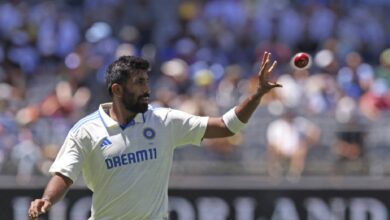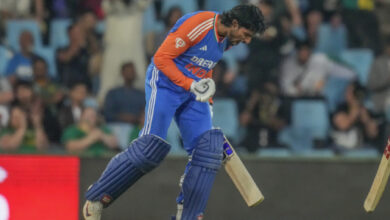Chess World Championships: Of hypnots, spies and multiple toilet breaks

In November 2021, in the middle of his skirmish with Ian Nepomniachtchi for the world chess title, Magnus Carlsen was asked a fan during a press conference if he would share his birthday cake with the Russian challenger. It was a question that brought smiles across both sides of the board.
“With the hory of World Championships matches, I don’t think you would accept any piece of food from the opposing team. Ever!” the Norwegian said.
Carlsen, who went on to win the title, isn’t defending his crown at this year’s World Championship, which officially begins on Friday. And even though he said it as a joke, Carlsen’s seemingly-innocuous comment was an honest indicator of the undertone that every world chess championship clash carries. At the most prestigious event in chess, the drama extends far beyond the 64 squares and the tactics used can leave the espionage manoeuvres ofCold War spies in shade.
Just ask Viswanathan Anand, a veteran of many world championship battles with Garry Kasparov, Anatoly Karpov, Vladimir Kramnik, Boris Gelfand, Vaselin Topalov and Carlsen himself. Over the years as a contender and as champion, Anand saw his fair share of psychological attempts to rattle him in World Championships contests.
Playing against the far more experienced Kasparov at the Observation Deck of New York’s World Trade Centre in 1995, the Russian would bang his pieces on the board, would leap off the chair after making moves and would slam the door behind him when he left the room during games.
“It was presumably an effort to rattle me and I found it thoroughly unpleasant,” writes Anand in his autobiography Mind Master about Kasparov, whose mannerisms in the 10th game of that contest he compares to that of an “ill-tempered, marauding highwayman”.
After Karpov beat Anand in the 1998 World Championship contest in Lausanne, the Russian made sure that the vanquished GM heard him tell a journal that Anand was a “nice guy, who doesn’t have the character for a big win.”
Later on, when the Indian duelled with Topalov in 2010 at Sofia, the Bulgarian first refused to talk to Anand at all throughout the contest. During games, his manager would pretend to be talking on the phone in front of the stage occasionally, trying to convey that someone was passing him messages.
While that may not have been true, his side were, in fact, being helped a supercomputer. Little did Topalov know that Anand was in turn being helped one-time rivals Kramnik and Kasparov in his preparations, while future rival Carlsen had played a few sparring games with him in the build-up, a testament to the fact that there are few permanent enemies or friends in chess.
The sense of paranoia that engulfs players at the peak of the world chess championship was highlighted the fact that Anand’s team had hired an undercover security agent to ensure that Topalov was not misusing his home advantage and planting bugs in the Indian’s hotel room.
Forfeits and proxy Cold War
Topalov was involved in another memorably ill-tempered contest against Kramnik in 2006. The Bulgarian’s manager complained that the Russian was making around 50 trips to the toilet during a single game which had to be cause for suspicion as it was the only area not being videotaped at the venue. Those accusations led to the organisers sealing the private bathrooms of both competitors shut and asking them to use a common one instead. The governing body also reviewed the footage to count how many times Kramnik had visited the loo (much less than 50!) The Russian protested the decision to seal the toilets forfeiting the next game. The organisers caved in. The toilets were unsealed.
The 2006 clash between Kramnik and Topalov wasn’t the first time the world chess championship had seen a match being forfeited. That honour went to USA’s Bob Fischer who, in 1972, met Soviet Union’s Boris Spassky in Reykjavik in an encounter that was a proxy for the Cold War enveloping the rest of the world at the time.
Upset film and TV equipment in the room for Game 1, which he lost, Fisher chose to stay back in his hotel room for Game 2. An article in The New York Times, almost comically, encapsulated the farce that played out that day: “Spassky sat before the chessboard for about five minutes, looking uncomfortable, and then left the stage. The audience of about 1,000… watched the two empty chairs for an hour, with a sort of mesmerised fascination. There was no talking.”
Such was the political interest in the game that Henry Kissinger, then US Secretary for State, contacted Fischer convincing him to play Game 3 while the Soviet chess federation ordered Spassky to return home, a request he ignored.
The third game was played in a private room. The American, trailing 0-2 in the contest but with a slight psychological advantage at having his demands met, duly won. He went on to dethrone Spassky in the 21st game of the event.
But all of that fades when you think back to the 1978 contest between Russians Viktor Korchnoi and Anatoly Karpov. The former was a defector from the Soviet Union, detested so deeply the USSR that Soviet journals covering the game referred to him as “the opponent” rather than his name.
Karpov, the Soviet’s chosen blue-eyed boy, refused to shake hands with the defector, who had been critical of the homeland. The patriot enled the services of a hypnot, who he planted in the front row during games. The dissident responded sporting sunglasses that had mirrors on them.
The tomfoolery didn’t end there. In Korchnoi’s corner were two members of an Indian sect called Ananda Marga, who were out on bail after stabbing an Indian embassy official in Manila.
Carlsen’s joke about not eating food offered the other team might have its genesis in the Korchnoi-Karpov faceoff of 1978. The two Russians sparred off the board over yogurt sent to Karpov his team during a game. That same event also saw claims that one player’s chair was being used to send him messages (presumably, the anal beads that GM Hans Niemann is alleged to have used were not in vogue back then). And it was well known that Korchnoi prepared for the bruising contests fuelling himself with a can of caviar (that came from Iran, not Russia, lest they be poisoned!)
xxx
The drama and intrigue in the build-up to a world chess championship typically begin much before the players sit across the board for Game 1. The competitors go to great lengths to derive any advantage – tangible or psychological – over their opponent. This reflects in their months of obsessive training for the event itself huddled in houses with their seconds. The names of the seconds have traditionally been a closely guarded secret at least the event wraps up.
Kirill Zangalis, the manager of Sergey Karjakin, told Russian newspaper Sport-Express, that the Russian GM had spent over a million dollars to train for the world championship contest in 2016. It was during that gruelling showdown that the world saw the unflappable facade of Carlsen crack, when the Norwegian stormed out of a press conference before it even began after he had lost a game to Karjakin.
As Fischer once remarked, “Chess is war over the board. The object is to crush the opponent’s mind.”
In this war, there is no scope for birthday cakes.







